Water exercise offers ideal low-impact options for active aging. You’ll benefit from gentle water walking for joint health, aquatic resistance training for strength, deep water aerobics for cardiovascular fitness, aqua yoga for flexibility and balance, and group water circuit training for social engagement. These workouts reduce joint strain while improving mobility, strength, and heart health. Each technique provides unique advantages that support your fitness journey as you continue to thrive in your golden years.
Gentle Water Walking and Jogging for Joint Health
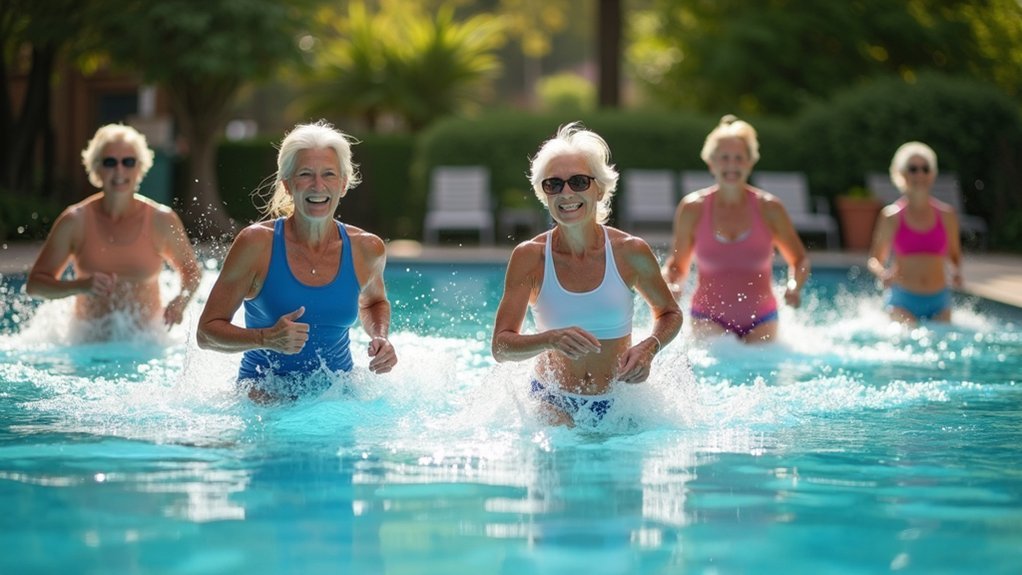
Stepping into a pool opens up a world of joint-friendly exercise possibilities for older adults. The buoyancy of water supports your body weight, dramatically reducing compression on your joints while you move. This allows you to exercise without aggravating existing arthritis or joint degeneration.
Water walking engages multiple muscle groups simultaneously, improving joint stability and range of motion. You’ll benefit from increased heart rate and better circulation without the harsh impact of land-based activities. Studies show that water walking effectively lowers blood pressure while providing therapeutic benefits for seniors.
Try varying your pace—gentle walking provides cardiovascular benefits, while water jogging offers higher intensity without additional joint stress.
The supportive aquatic environment also helps you practice balance safely, minimizing fall risk while strengthening the muscles critical for stability. You can easily adjust intensity by changing your speed or water depth to match your fitness level.
Aquatic Resistance Training for Muscle Strength
While water walking focuses on joint mobility and cardiovascular health, resistance training in the pool offers a powerful way to build muscle strength as you age.
The water’s unique properties create variable resistance that adjusts to your movement speed, protecting your joints while effectively engaging muscles both eccentrically and concentrically.
- You’ll experience significant strength gains, especially in upper limb and leg power, through short-term programs that progressively increase intensity.
- Your balance will improve due to water’s buoyancy and hydrostatic pressure, which enhance muscle recruitment timing.
- You don’t need swimming skills—aquatic workouts are accessible even with limited mobility.
- Using specialized aquatic equipment increases drag force, further enhancing your strength development while maintaining low impact on your joints.
Regular participation in aquatic resistance training can effectively combat sarcopenia, the age-related loss of muscle mass and function that typically affects older adults.
Deep Water Aerobics for Cardiovascular Fitness
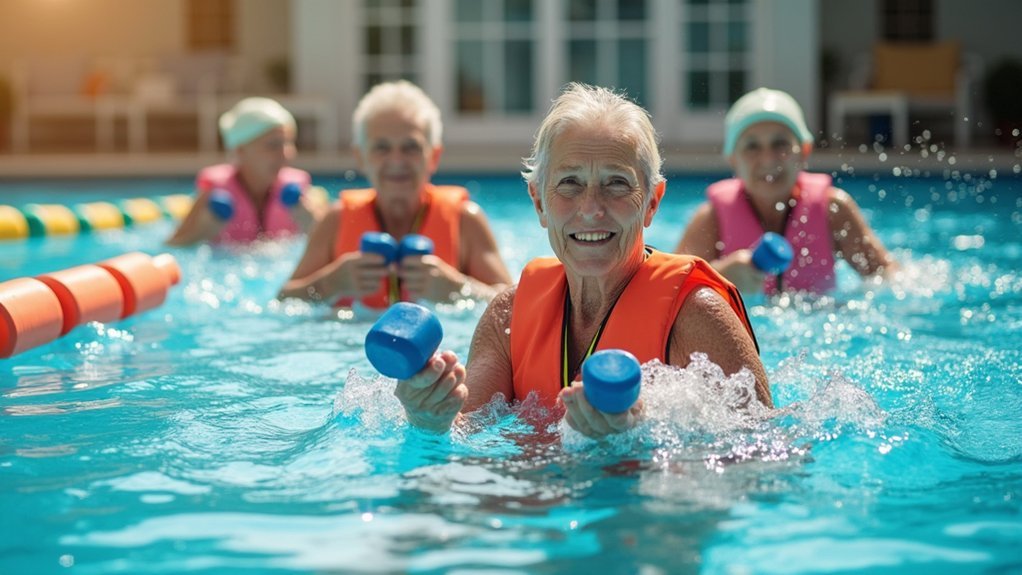
The buoyant sanctuary of deep water provides an ideal environment for cardiovascular training as you age. With water supporting up to 80% of your body weight, you’ll experience less joint strain while maintaining elevated heart rates necessary for cardiovascular conditioning.
Regular deep water aerobics strengthens your heart muscle, helping it pump more efficiently while reducing risks of cardiovascular disease and hypertension. The hydrostatic pressure naturally improves circulation and dilates blood vessels, decreasing systolic blood pressure over time. A 12-week program can reduce blood pressure by approximately 0.83 mmHg. Deep water aerobics allows you to meet the recommended 150 minutes weekly of aerobic activity for optimal heart health.
You’ll notice improvements in daily activities like climbing stairs and walking as your cardiovascular fitness increases.
Though you’ll need consistent participation to see changes in triglyceride levels and body composition, twice-weekly sessions for 12 weeks can deliver meaningful cardiovascular benefits without high-impact stress.
Aqua Yoga and Stretching for Flexibility and Balance
Water offers more than just cardiovascular benefits for aging bodies—it creates an ideal sanctuary for flexibility and balance training through aqua yoga and stretching. The buoyancy reduces joint strain while allowing you to stretch more deeply than on land, perfect if you’re managing arthritis or mobility issues. Practicing in warm water temperatures can further enhance muscle relaxation and therapeutic benefits during your stretching routine.
- Enhanced Range of Motion – Warm water relaxes your muscles, improving blood circulation and making stretches more effective.
- Fall Prevention – Practice balance challenges in a forgiving environment where falls won’t result in injury.
- Mental Clarity – The soothing properties of water combined with mindful movements sharpen focus and potentially improve memory.
- Sustainable Exercise – You don’t need swimming skills to participate, making these activities accessible regardless of your fitness level.
Group Water Circuit Training for Social Engagement
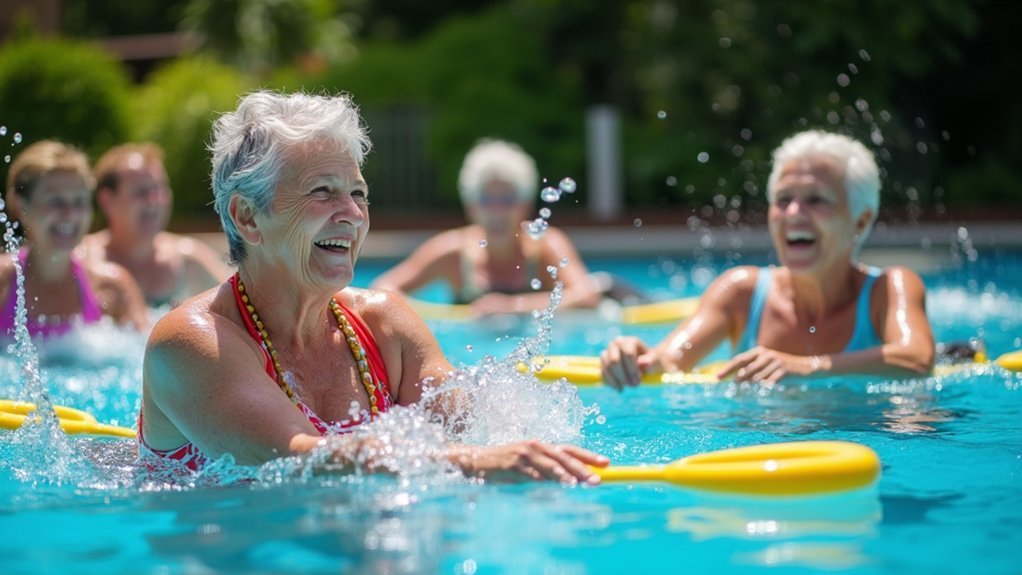
Energizing both body and mind, group water circuit training transforms traditional exercise into a dynamic social experience that’s particularly beneficial for active aging.
You’ll rotate through multiple stations in shallow or mid-depth water, targeting cardio, strength, and flexibility while enjoying the safety of reduced joint impact.
As you work through short-duration, high-intensity intervals, you’re not just burning 400-500 calories per hour—you’re building community.
The structured, instructor-led format creates opportunities for peer support and lasting relationships that combat isolation.
These aquatic circuits offer cognitive benefits too, with studies showing greater mental improvement compared to non-exercising seniors. Each station targets hard-to-reach muscles, like abdominals and lower back, providing comprehensive muscular development.
The combination of social engagement, physical challenge, and reduced stress creates a holistic approach to wellness that keeps you coming back.
Frequently Asked Questions
Do I Need to Know How to Swim to Participate?
No, you don’t need to know how to swim to participate. Many aquatic workouts take place in shallow water where you can stand, and instructors provide flotation devices for deeper water exercises.
What Should I Wear to Aquatic Workout Classes?
For aquatic workout classes, you’ll want chlorine-resistant swimwear that allows free movement. Consider one-piece suits, swim shorts, or rash guards. Add water shoes for grip and a swim cap to protect your hair.
How Warm Is the Pool Water Typically Kept?
Pool water is typically kept between 82-84°F for recreational swimming. For your aquatic workout, expect temperatures around 82°F for adult aerobic activities, though they may be warmer (86-88°F) for moderate exercises.
Can I Participate if I Have Open Wounds or Skin Conditions?
You shouldn’t swim with open wounds unless they’re completely covered with waterproof bandages. For skin conditions, consult your doctor first. Consider alternative exercises until you’re healed to prevent infection and delayed healing.
Are There Special Aquatic Shoes I Should Invest In?
Yes, you should invest in water shoes with non-slip soles and quick-drying materials. They’ll protect your feet, improve stability, and prevent falls on slippery surfaces while providing comfort during your activities.
In Summary
You’ve discovered that water offers the perfect environment for staying active as you age. You’ll enjoy reduced joint stress while building strength, flexibility, and cardio health. Whether you’re walking in shallow water or stretching in a group class, you’re gaining both physical and social benefits. By incorporating these aquatic workouts into your routine, you’ll maintain mobility and independence for years to come.

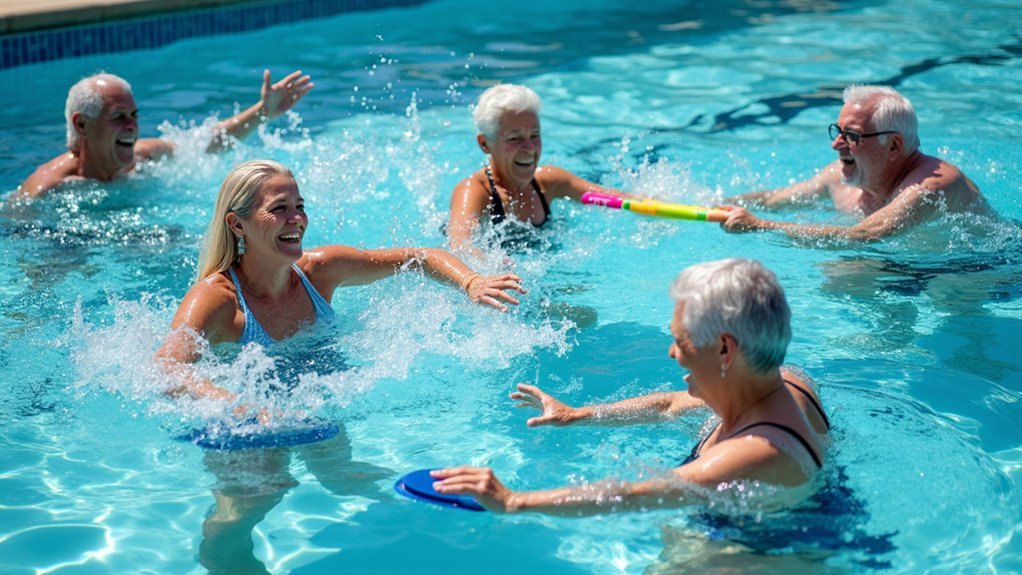
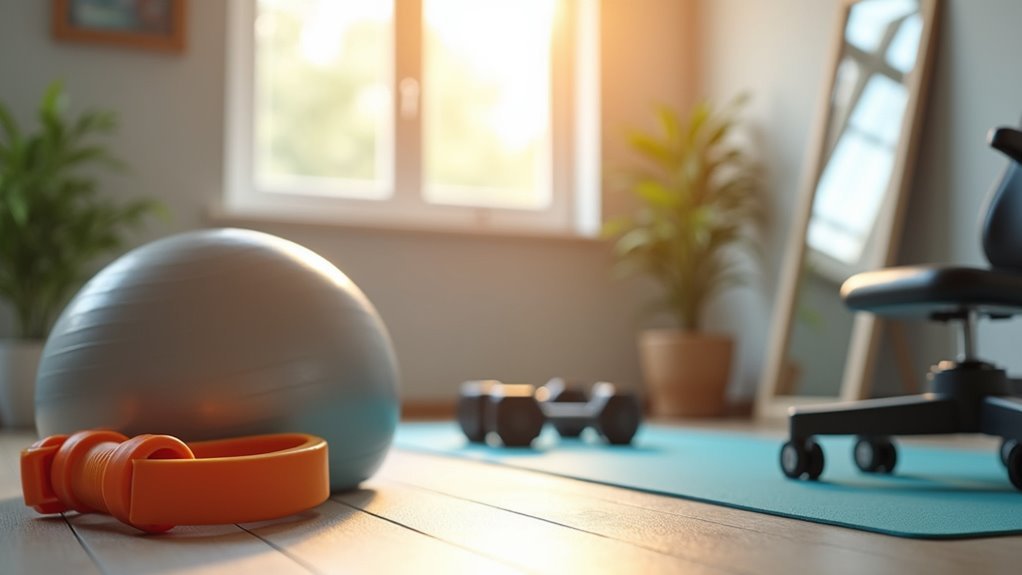
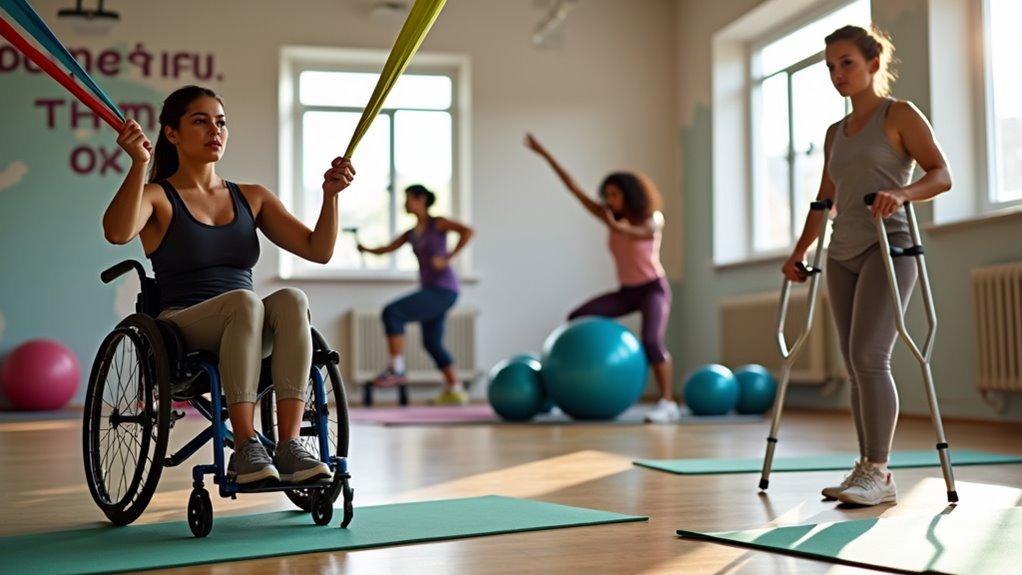
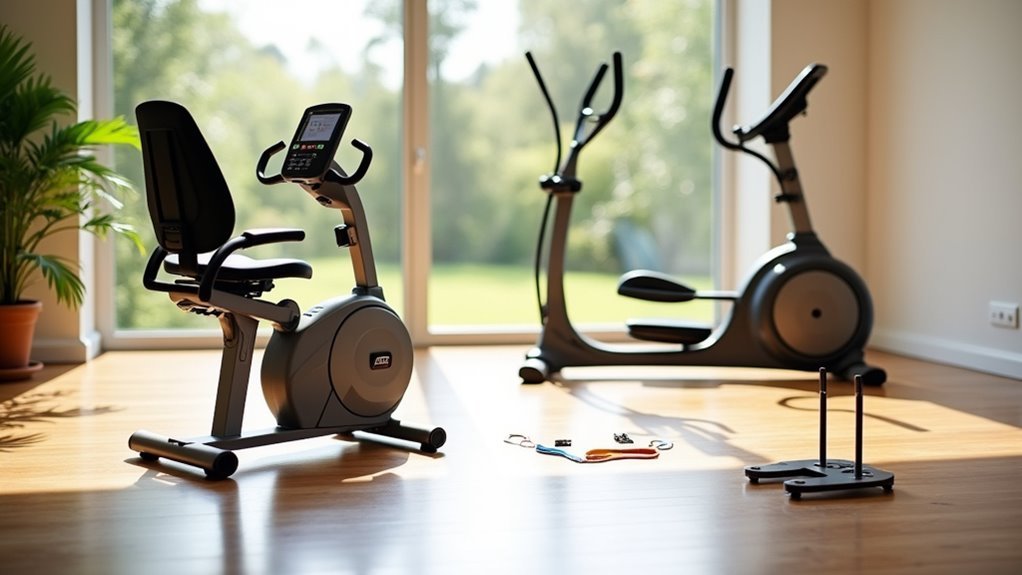
Leave a Reply